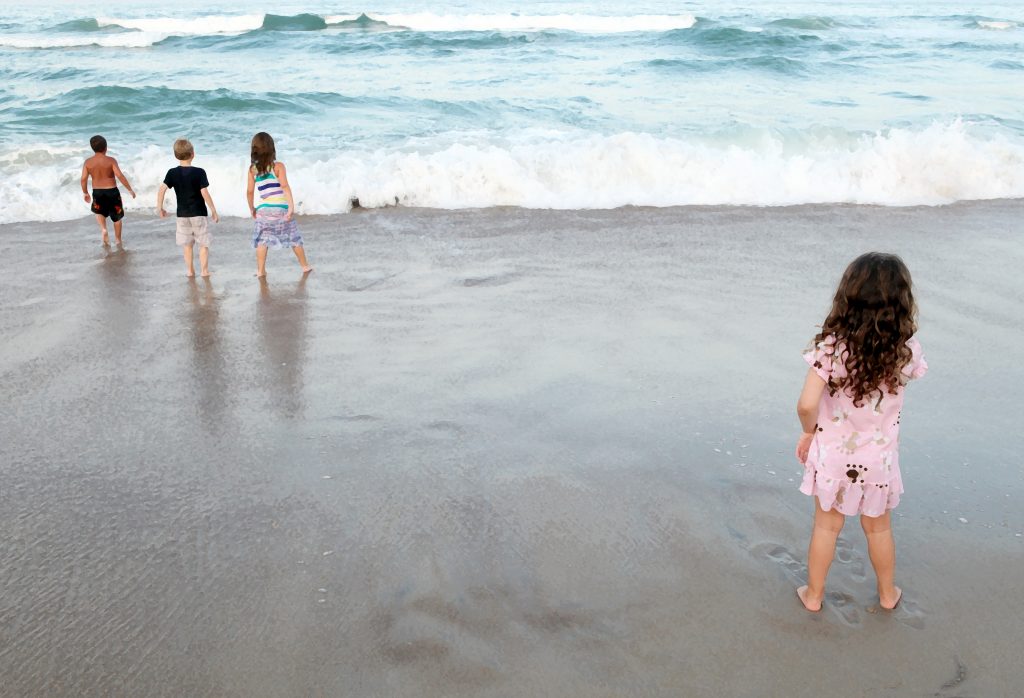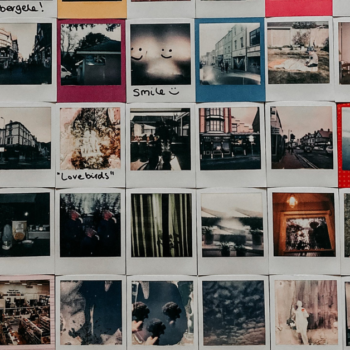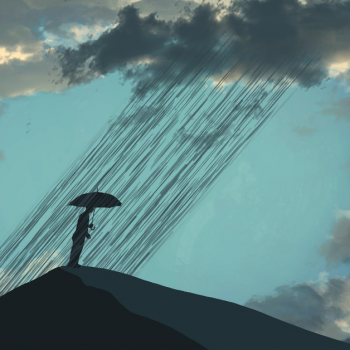Introverts and Grief: Exits Are to the Front and Rear of the Funeral Home
/ Coping with Grief : Eleanor Haley
You know those emergency exit announcements they make whenever you’re in a crowded place?
Ladies and gentlemen, please note the exits are to the front and rear of the auditorium. Upon activation of a fire alarm, proceed calmly to the nearest exit.
You know the ones I'm talking about... You hear them all the time and they're always the same. I mean, who even really listens to them?
Introverts like me, that’s who!
I need to know how to GET OUT in case of social awkwardness, exhaustion, or discomfort at all times. So imagine how I feel when, days after my mother dies, I find myself trapped—staring down an endless line of black dresses and dark suits; a veritable who’s who of my family’s past, all waiting to do the awkward hug-or-no-hug tango.
Towards the beginning of the line, I see the heads start to tilt in sympathy and I imagine people like my high school English teacher and old whats-his-name from down the street doing neck stretches in the lobby. God, I’m such a horrible person. These people are here to support me and all I want to do is find a place to hide. I briefly contemplate the types of places I could find to hide in a funeral home and immediately abandon the idea.
Generally speaking, I’ve embraced my introverted nature—but times like these, I wish I could be anyone but who I am. I feel stupid and embarrassed. My palms are sweaty. My attitude is horrible. I understand the need for ritual, but forcing grievers to engage in small talk with hundreds of people? Now that seems like a form of torture that should be reserved for PTA luncheons and college orientations.
I take solace knowing I’m not alone in my misery; my father, brothers, and sisters all share similar temperaments. They fall differently along the introvert/extrovert continuum, but I know—like me—they would give anything to spend rest of the evening at home.
In Susan Cain’s book Quiet: The Power of Introverts in a World That Can’t Stop Talking, she notes that ⅓ to ½ of Americans fall somewhere on the introverted end of the spectrum. No, this doesn't mean ½ of all Americans are homebody loners. Introverts are social and have friends just like anyone else. The difference is they are more likely to opt for low-key situations such as spending time one-on-one or with small groups of friends, co-workers, and family members.
We are all different of course, but Cain notes a few typical characteristics of introverts:
- Drawn to the inner world of thought and feeling
- Have a tendency to focus on analyzing and making meaning of events going on around them
- Draw energy from being alone, as opposed to extroverts who draw energy from socializing with other people
- Feel drained after spending time around large groups of people
- Prefer one-on-one conversations and spending time with smaller groups of people
- Enjoy less stimulating situations and find crowds of people to be arousing
- Tackles tasks slowly, deliberately, and one at a time; often have a knack for concentration
- Are less drawn to wealth, fame, and status than their extroverted peers
- Listen more than they talk
- Think before they speak
- Often express themselves better in writing
- Dislike conflict
- Dislike small talk but enjoy discussions about topics that interest them
- May be highly "sensitive"
Grief is hard for everyone, but introverts face their own set of challenges after a death. Starting with the fact that after a death, it sometimes seems like you're on stage and everyone's watching to see what you do. How are you coping? How are you holding up? At the wake, at the funeral, at the coffee hour afterward; 100 sets of eyes all fixed on you, waiting for their opportunity to shake your hand and pay their condolences.
After a death—and before, in the case of terminal illness—grievers are surrounded by people asking the same questions and offering the same standard platitudes. Grievers are forced to chit chat about everything from the weather to (groan) their feelings. Not wanting to seem ungrateful or impolite, they engage with everyone—on the phone, at the funeral, at work, in the grocery store, on the internet, in their own home. I'm exhausted just thinking about it.
I wouldn't be surprised if it took certain introverts a long time to get out into the world after a loss, if for no other reason than because they know they will encounter people. When my mother was dying, I felt like everywhere I went I was asked for the latest update. I was hesitant to go anywhere for fear of having yet another awkward conversation. I mean, why not stay home until at least the third degree of separation forgot I was in mourning? My friends knew where to find me.
My very basic advice to introverts dealing with grief is to accept your nature and go easy on yourself. You will likely have to endure the rituals associated with the funeral and, for a while after the death, people are probably going to want to check in, call, drop by, and stop you on the street. Acknowledge these things may be draining for you and plan to give yourself a little extra space and time. Also, don't be surprised if the coping mechanisms that worked for your extroverted friend—like widow/widower happy hours and support groups—don't feel as right for you! You may feel more comfortable talking to a friend or family member who's had similar experiences, connecting with an online community, writing in a journal, or reading things like books or grief blogs.
As for those hoping to support an introvert, I will forever be grateful to those closest to me because they had the foresight to follow my lead. Introverts and extroverts are often good complements to one another, but they can also have a heck of a hard time understanding one another. We often talk about how people cope differently depending on their loss, temperament, personality, and circumstances; introversion is just one more variable to take into consideration. It stands to reason that introverts may be less interested in having a constant stream of people around for support because they need alone time to recharge, remember?
Not an introvert? I bet you can still kind of relate. Never fear though, our team is one-half extrovert so go on over to the subscribe bar and sign up to receive posts straight to your inbox.
We wrote a book!
After writing online articles for What’s Your Grief
for over a decade, we finally wrote a tangible,
real-life book!
What’s Your Grief? Lists to Help you Through Any Loss is for people experiencing any type of loss. This book discusses some of the most common grief experiences and breaks down psychological concepts to help you understand your thoughts and emotions. It also shares useful coping tools, and helps the reader reflect on their unique relationship with grief and loss.
You can find What’s Your Grief? Lists to Help you Through Any Loss wherever you buy books:







Stan D July 28, 2023 at 12:07 pm
Nothing can be as good as this!
Emily December 9, 2021 at 2:46 pm
I too am an introvert. When my husband died unexpectedly at 39 I was thrown into the spotlight. People were concerned and curious. He was so young and vibrant there was an overall sense of disbelief. I appreciated everyone’s concern and attempts to help our family. If I was honest with everyone I would have rather stuck needles in my eyes than having to navigate what felt like a never ending stream of people stopping by our home, my office, everywhere. It made me extremely uncomfortable, and I felt I had to hide my emotional distress to accommodate their feelings. I waited nearly 3 weeks to have a service, and I was physically sick when the time arrived. All of those eyes on me, assessing how I was doing, wanting details about his death, questions about my next steps. It was overwhelming. After I stayed close to home for weeks with my kids to recover.
Rachel January 2, 2021 at 5:37 pm
I’ve never thought about how other introverts deal with death. I was just talking to my best friend the other day and she mentioned my mother’s funeral (I was 12 then). She was telling my kids that she didn’t understand why I wasn’t crying at the funeral home and I was running around playing with my cousins. I tried to tell her it was because I was embarrassed for people to see me crying and upset, but I didn’t do a very good job of it (this is 27 years later). I still avoid the topic of my mom’s death, even with my father, siblings, husband and kids because I can’t talk about it without getting visibly upset and I hate for anyone to see me crying.
Rachel December 12, 2019 at 8:23 am
I forced myself to do the whole “thank you for coming” a million times for my Dad’s funeral in my twenties. At my Mom’s a few years later, I couldn’t do it. I was the spokesperson for 5 years to everyone including my brothers and sisters who were spread across the country and of little help to us when she was fighting so hard to beat her cancer. Most of them were there for her funeral and I thought to myself, tag you’re it, and took my butt right to the back corner to sit and grieve on my own.
Gail Goddard November 5, 2019 at 12:18 pm
Thank you for this conversation. Our daughter died a few years ago at 17 – suicide after a five year struggle with an eating disorder and anxiety. My husband is even more of an introvert than me. We have found an AFSP support group very helpful and attend when we can. We are willing to help others one on one by sharing our story and listening to their stories. We are willing to contribute to appropriate fund raisers and not for profit organizations. However, the idea of setting up a foundation, or agreeing to meet with the local news reporter, and otherwise speak publicly makes our stomachs churn. We are so impressed that people use their energy from grief in this way.
John January 11, 2018 at 9:51 pm
Thank you so much for sharing this. I wish you well.
John January 11, 2018 at 9:51 pm
Thank you so much for sharing this. I wish you well.
Laura Hains September 23, 2017 at 12:19 pm
I was so devasted by my daughter.s death that I couldn’t fathom dealing with people I hardly knew. I am introvert and couldn’t imagine expressing my sorrow at a funeral. I. Had a quiet get together and invited my few good friends and close friends of my daughter. Society (people) expects too much from us and they also want our “money”
Laura Hains September 23, 2017 at 12:19 pm
I was so devasted by my daughter.s death that I couldn’t fathom dealing with people I hardly knew. I am introvert and couldn’t imagine expressing my sorrow at a funeral. I. Had a quiet get together and invited my few good friends and close friends of my daughter. Society (people) expects too much from us and they also want our “money”
Sue September 22, 2017 at 12:39 am
The military funeral with the procession, and gun salute and folding and delivery of the flag to me was so hard. I couldn’t stop sobbing and felt like I was under a spotlight. I knew ahead of time I couldn’t say anything to those gathered and I felt like I was letting them and him down. I still need to find a way to let the world know what an amazing man he was.
Joe November 3, 2017 at 9:16 am
Sue.
You haven’t let anyone down.
Sharing these feelings publicly is dificult and brave…….I think that the person (you didn’t state Husband or Son,so I won’t assume either,both are equally difficult loses.) you lost would be incredibly proud of you,afterall,you’ve shared their memory showing how proud you were of them.
It’s cliche to say “Don’t be so hard on yourself”. So,I wont. Grief and any guilt (things left unsaid and undone) you might have is your own. Over time you’ll accept and deal with it.
I doubt anyone will judge you for the way you experience your loss.
So,to end my thoughts here I will leave you with a tried and true cliche…..”Keep your chin up”. and be proud of the memories that loved left you because in time you’ll be able to openly share them.
Carrie December 22, 2014 at 10:59 pm
When my mom was sick, I was bombarded with people wanting updates and somehow became the default family spokesperson. I couldn’t remember who I told what, and I wanted to chuck my phone out the ICU window. It took me about 10 days to run screaming to my phone and set up a CaringBridge site. I posted on her Facebook, mine, and blast-emailed: “Updates are HERE and only here. I need to focus on being WITH mom instead of trying to remember who I told what.” I posted once a day (more if there was an urgent prayer need). It was a godsend. Looking back, it’s good to have the whole story of what happened in one place, and it’s neat to see all the messages and prayers for her on the guestbook. Those who wanted updates could subscribe, they could share it, and they didn’t have to involve me.
After she passed, and when my dad was sick, I found that people didn’t really ask me much once we got past the funeral. When my dad passed away, I used that same CaringBridge site…it was only 8 1/2 months later.
Now that we’re 9 months past HIS funeral, I find that I NEED to talk about it and I NEED to have someone ask me uncomfortable questions that help me through the grief process….and finding a fellow introvert who is a Christian counselor is exactly what I need. She’s been a godsend as well.
Beth Marshall December 22, 2014 at 5:16 pm
Eleanor- Have you been reading my mail? This post is extraordinary.
And, “forcing grievers to engage in small talk with hundreds of people, now that seems like a form of torture that should be reserved for PTA luncheons and college orientation,” pretty much sums it up! Thank you. 🙂
Tina December 22, 2014 at 11:04 am
This a hundred times! My husband and I were BOTH introverts. We understood each other like no one else could. At funerals, parties, anywhere, we’d find ourselves a corner to hide and where one of us was there was the other. Last year I had to do the funeral thing alone because it was his. All I wanted was him to be there in a corner with me. Everything you described about mourning is exactly how I feel now. I write in a journal, like to be left alone, read, online communities. It’s a horrible place to be when a paired introvert loses their cornermate. My mom is very sick now and I’m not sure how I’ll get through that without him. A part of me is so angry with him. I was there with him to help him through losing his mom and now I have to do mine alone. 44 was way to young to become a widow especially when losing him meant losing the best of the very very few friends I allowed into my world.
Lisa September 21, 2017 at 5:04 pm
Tina, I felt that way too. And I still feel that emptiness of having the one who knew you best, suddenly gone. And nothing can ever take his place. Thank you for writing this. Peace.
vinnie October 15, 2014 at 4:47 pm
thanks so much Eleanor for commenting on this. I am finding a dearth of research out there on this. I guess whatever I do will be groundbreaking.
Eleanor October 17, 2014 at 9:47 am
Vinnie,
Please let us know what you come up with! Also, please let us know if we can help in any way.
Eleanor
Aine November 18, 2017 at 12:33 pm
Hi there I’m wondering how your paper is going I’m really interested in this topic – working as a grief support worker with children and families
Vinnie October 10, 2014 at 11:54 pm
I have a scholarly paper to write. I’ve decided my topic is Grieving Introverts. I am trying to figure out how to extend our knowledge base in this area. Any ideas? Any good reading on this topic other than your fine article?
Eleanor October 11, 2014 at 5:06 pm
Hey Vinnie,
I tweeted this at you but the best book I’ve read on introverts is the one I’ve referenced here – Quiet. This is a long shot but I think there are online communities/forums for Introverts where you might look or ask like on Reddit or here is a page that I’ve seen linking to ours -https://www.scoop.it/t/infp – but it looks like it’s just a page not a place to ask questions.
Honestly in looking into this I didn’t find any really notable research on the subjects of grief AND introverts although there’s tons of research on one or the other. I guess you may have to come up with you’re own hypothesis based on what you can gather about both. I think anecdotally we can make a lot of assumptions about how being an introvert impacts our experience of grief and the coping tools we use, but as far as research to back them up I’m sorry I can’t help more. Please let me know if there’s anything else we can do to assist you, I think this is a very interesting topic and I’d love to see some more investigations into it.
Sincerely,
Eleanor
Sheila Bergquist September 4, 2014 at 1:33 am
Being an introvert, this hit the nail on the head for me. There are so many things that arise in the face of grief besides the obvious ones. So many surprising things to deal with…things you never thought of. Love this article!
Namita August 13, 2013 at 8:05 pm
Hi Eleanor,
Your article was so good to read. Being an introvert, I find most comfort in turning inward when I am grieving. In my teens and twenties, going by the ‘extroverted ideal’ I would observe in the culture I am from, I made the incorrect assumption that asking for and then receiving comfort from others – being social – is the best way to cope and grow. I was exhausted by it all – the sheer no of people I was interacting with and how much advice they were dolling out.
When my 3 month marriage ended horrifically, I suddenly found myself in the spotlight. My family, friends, well wishers checking in on me everyday and expecting me to want to talk endlessly about my grief and pain, and then get energized by the words of advice they were giving. They expected me to want to talk about life, family, religion, grief, depression, my feelings, my view on the world etc – basically talking endlessly so they can assess whether I am doing okay. I could not take it anymore and decided to retreat. Wonders happened to my psyche and soul when I started connecting with myself. I saw that my way of coping with my grief is by keeping quiet. I have offended a lot of people along the way who are not happy that I don’t want to talk about my pain, and instead assume that I am suffering from depression and on a downward path in general. Paradoxically, I could not be happier with my life 🙂 less words, more smiles. I love it
Eleanor August 15, 2013 at 12:18 pm
Namita,
I feel like I went through a very similar struggle in my younger years, feeling like I ought to be social all the time . It was hard for me and I struggled, which I now know was because it wasn’t in my nature to always be connected with other people. It’s not that I like always being alone, I just preferred being around close groups of friends.
I’m sorry about your spouse and your struggles afterwards, but I’m so so SO happy you found what works for you and I love what you said, “less words, more smiles”. That should be the introvert mantra.
Eleanor
Sarah hasegawa August 9, 2013 at 9:04 am
Poor Bob had to shop in another town after Brenda died. You are right — it isn’t easy being an introvert in mourning. It’s even worse in a small town, where everyone has known you for 35 years. You can’t escape!